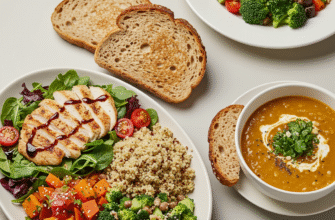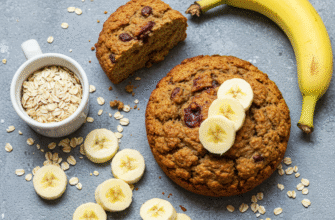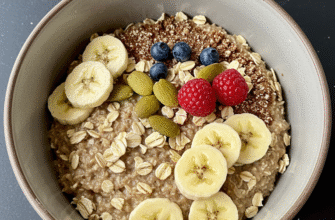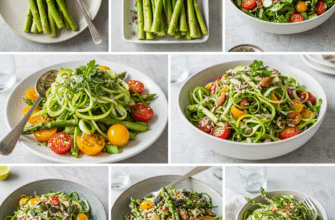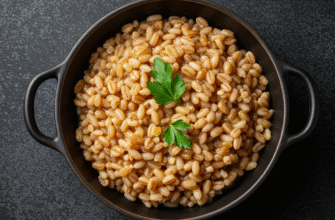Feeling drained, sluggish, and just plain tired seems to be a common complaint these days. While juggling work, family, and social lives, it’s easy to find your energy reserves running on empty. Lack of sleep, stress, and inactivity certainly play major roles, but what you put on your plate has a profound impact on your daily vitality. Relying on quick fixes like sugary snacks or endless cups of coffee often leads to an energy crash later on. The good news is that making thoughtful food choices can provide a steady, sustainable source of energy to help you power through your day naturally.
Think of your body like a car; it needs the right kind of fuel to run efficiently. Food provides this fuel in the form of calories, derived from carbohydrates, proteins, and fats. However, not all fuel sources are created equal when it comes to sustained energy. Highly processed foods and simple sugars might give you a quick burst, but they cause your blood sugar levels to spike rapidly and then plummet, leaving you feeling even more tired than before. The key is to focus on whole, nutrient-dense foods that release energy slowly and steadily.
The Foundation: Complex Carbs and Steady Energy
Carbohydrates are the body’s preferred source of energy, but the type matters immensely. Simple carbohydrates, found in white bread, pastries, sugary drinks, and candy, are digested quickly. This leads to that notorious sugar rush followed by a slump.
Complex carbohydrates, on the other hand, are your allies in the fight against fatigue. They are made up of longer chains of sugar molecules and often contain fiber, which slows down digestion.
This slower digestion means a gradual release of glucose (sugar) into your bloodstream, providing a more stable and prolonged energy supply. No more dramatic energy peaks and valleys! Incorporating complex carbs into your meals helps maintain consistent energy levels throughout the day.
Excellent Sources of Complex Carbs:
- Oats: A fantastic breakfast choice. Opt for rolled oats or steel-cut oats over instant varieties, which can sometimes contain added sugars. Oatmeal is packed with soluble fiber, which aids digestion and promotes sustained energy release.
- Whole Grains: Think brown rice, quinoa, barley, whole wheat bread, and whole wheat pasta. These grains retain their bran and germ, providing fiber, vitamins, and minerals crucial for energy production.
- Legumes: Beans, lentils, and chickpeas are nutritional powerhouses, offering complex carbs, protein, and fiber. They are incredibly versatile and budget-friendly.
- Starchy Vegetables: Sweet potatoes, butternut squash, and corn provide complex carbs along with essential vitamins and antioxidants.
Protein Power: Building Blocks for Endurance
Protein isn’t just for bodybuilders; it plays a vital role in sustained energy. While not the primary energy source like carbs, protein helps slow down the absorption of carbohydrates when eaten together. This further stabilizes blood sugar levels, preventing energy dips. Additionally, protein is essential for building and repairing tissues, including muscles, and is involved in the production of enzymes and hormones that regulate various bodily functions, including energy metabolism.
Including a source of lean protein in each meal and snack can significantly contribute to feeling full, satisfied, and energetically stable. It helps curb cravings for less healthy options and provides building blocks your body needs to function optimally.
Top Lean Protein Choices:
- Poultry: Skinless chicken and turkey breast are excellent lean options.
- Fish: Particularly fatty fish like salmon, mackerel, and sardines, which also provide omega-3 fatty acids beneficial for brain health and reducing inflammation.
- Eggs: A complete protein source packed with vitamins and minerals.
- Legumes: Beans, lentils, and chickpeas double up as great sources of both complex carbs and protein.
- Tofu and Tempeh: Excellent plant-based protein options derived from soy.
- Lean Red Meat: In moderation, lean cuts of beef or lamb can provide high-quality protein and iron.
- Dairy/Alternatives: Greek yogurt (plain), cottage cheese, and milk or fortified soy milk contribute protein.
Healthy Fats: Essential for Overall Well-being
Fats often get a bad rap, but
healthy fats are crucial for overall health and can be a source of concentrated energy. Unsaturated fats (monounsaturated and polyunsaturated) are beneficial for heart health, brain function, and hormone production. While fats are digested more slowly than carbohydrates, providing a long-lasting energy source, it’s important to choose the right types and consume them in moderation as they are calorie-dense.
Including sources of healthy fats can enhance satiety, support nutrient absorption (especially fat-soluble vitamins like A, D, E, and K), and contribute to stable energy levels. Avoid trans fats and limit saturated fats found primarily in processed foods, fatty meats, and full-fat dairy.
Sources of Healthy Fats:
- Avocado: Rich in monounsaturated fats, fiber, and various vitamins.
- Nuts: Almonds, walnuts, pistachios, cashews – packed with healthy fats, protein, and fiber. Choose unsalted varieties.
- Seeds: Chia seeds, flaxseeds, pumpkin seeds, sunflower seeds offer healthy fats, fiber, and minerals.
- Olive Oil: Extra virgin olive oil is a great source of monounsaturated fats and antioxidants. Use it for dressings or low-heat cooking.
- Fatty Fish: Salmon, mackerel, herring, and sardines provide essential omega-3 fatty acids.
Micronutrients That Make a Difference
Beyond the macronutrients (carbs, protein, fat), certain vitamins and minerals play specific, critical roles in energy production and combating fatigue.
Iron
Iron is a component of hemoglobin, the protein in red blood cells responsible for carrying oxygen from your lungs to the rest of your body, including your muscles and brain. Insufficient iron can lead to less oxygen transport, resulting in feelings of tiredness, weakness, and difficulty concentrating. Including iron-rich foods is important for maintaining energy levels.
Good sources include lean red meat, poultry, fish, lentils, spinach, kidney beans, nuts, and fortified cereals. Pairing iron-rich plant foods with vitamin C sources (like citrus fruits, bell peppers, or tomatoes) can enhance iron absorption.
B Vitamins
The B vitamins (including B1, B2, B3, B5, B6, B7, B9, and B12) are crucial coenzymes in energy metabolism. They help your body convert the food you eat (carbohydrates, fats, and proteins) into usable energy (ATP). A deficiency in one or more B vitamins can disrupt this process and contribute to fatigue. Whole grains, eggs, lean meats, fish, dairy products, legumes, nuts, seeds, and dark leafy greens are generally good sources of various B vitamins.
Magnesium
This essential mineral is involved in over 300 biochemical reactions in the body, including energy production, muscle and nerve function, and blood glucose control. Even mild insufficiency might contribute to fatigue and muscle weakness. Find magnesium in leafy green vegetables (like spinach), legumes, nuts, seeds, and whole grains. Dark chocolate (in moderation!) is also a source.
The Crucial Role of Hydration
Never underestimate the power of water! Dehydration is a common, yet often overlooked, cause of fatigue, sluggishness, and brain fog. Even mild dehydration can impact your energy levels, mood, and cognitive function. Water is essential for virtually every bodily process, including transporting nutrients, regulating body temperature, and flushing out waste products.
Don’t wait until you feel thirsty – that’s often a sign you’re already slightly dehydrated. Aim to sip water consistently throughout the day. Keep a water bottle handy as a visual reminder. While individual needs vary, aiming for around 8 glasses (or 2 liters) is a common guideline. Herbal teas and water-rich foods like cucumber, celery, oranges, and watermelon also contribute to your daily fluid intake.
Stay Energized Tip: Prioritizing hydration is one of the simplest yet most effective ways to combat fatigue. Aim for consistent water intake throughout the day. Combine this with a balanced diet rich in complex carbohydrates, lean proteins, and healthy fats for sustained energy release and overall well-being. Remember, consistency is key.
Putting It All Together: Energy-Boosting Foods
So, what does this look like on your plate? Here are some specific foods known for their energy-supporting properties:
- Bananas: A convenient source of natural sugars (carbs), potassium, and vitamin B6, all supporting energy.
- Fatty Fish: Salmon and tuna provide protein and omega-3 fatty acids, which may help reduce inflammation sometimes linked to fatigue.
- Brown Rice: A whole grain high in fiber and manganese, a mineral vital for energy production from carbs and proteins.
- Sweet Potatoes: Packed with complex carbs, fiber, manganese, and vitamin A for sustained energy.
- Eggs: Offer high-quality protein and leucine, an amino acid that stimulates energy production.
- Apples: Provide fiber and natural sugars for slow-release energy.
- Water: Essential for preventing dehydration-induced fatigue.
- Dark Chocolate: Contains cocoa solids with antioxidants and stimulants like theobromine that can boost energy and mood (choose high cocoa content, consume moderately).
- Goji Berries: Used traditionally, these berries are packed with vitamins, minerals, and antioxidants.
- Quinoa: A complete protein source, also providing complex carbs, fiber, iron, and magnesium.
- Oatmeal: As mentioned, a champion of slow-release energy due to its soluble fiber.
- Yogurt: Particularly plain Greek yogurt, offers protein and probiotics which can support gut health, sometimes linked to energy levels. Watch out for added sugars in flavored varieties.
- Lentils: An excellent source of fiber, complex carbs, protein, and iron to replenish energy stores.
- Nuts & Seeds: Almonds, walnuts, chia seeds provide a blend of protein, healthy fats, and fiber for lasting energy.
Timing Matters Too
Eating energy-boosting foods is crucial, but *when* you eat also impacts your energy levels. Skipping meals, especially breakfast, can set you up for fatigue later in the day. Your body needs fuel after an overnight fast. Aim for regular meals and consider healthy snacks between meals if needed to maintain stable blood sugar and energy. A balanced breakfast, a nutritious lunch, and a sensible dinner, potentially with small, nutrient-dense snacks like a piece of fruit with nuts or yogurt, can help keep your energy consistent.
Ultimately, combating everyday fatigue involves a holistic approach that includes sufficient sleep, stress management, and regular physical activity. However, fueling your body with the right foods is a powerful and foundational step. By focusing on whole, unprocessed foods rich in complex carbohydrates, lean protein, healthy fats, essential vitamins, minerals, and plenty of water, you provide your body with the high-quality fuel it needs to operate at its best and keep fatigue at bay naturally.



